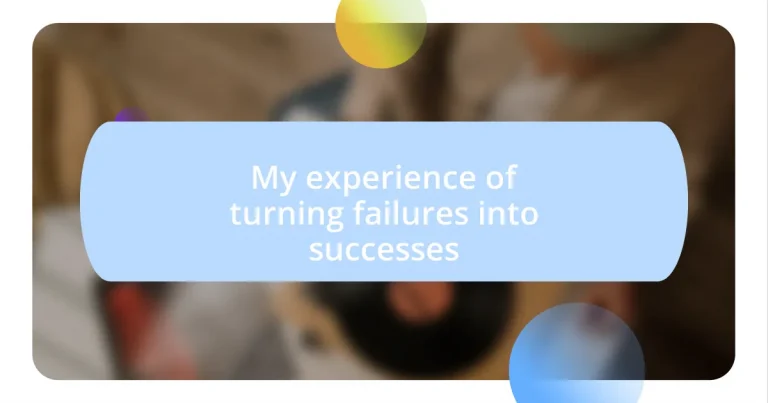Key takeaways:
- Failure is reframed as a stepping stone for growth, helping to build resilience and self-awareness through reflection and learning from experiences.
- Recognizing and confronting personal failures leads to actionable insights, which can turn setbacks into opportunities for improvement.
- Celebrating small wins and sharing accomplishments fosters motivation and encourages a supportive community, reinforcing the journey towards success.
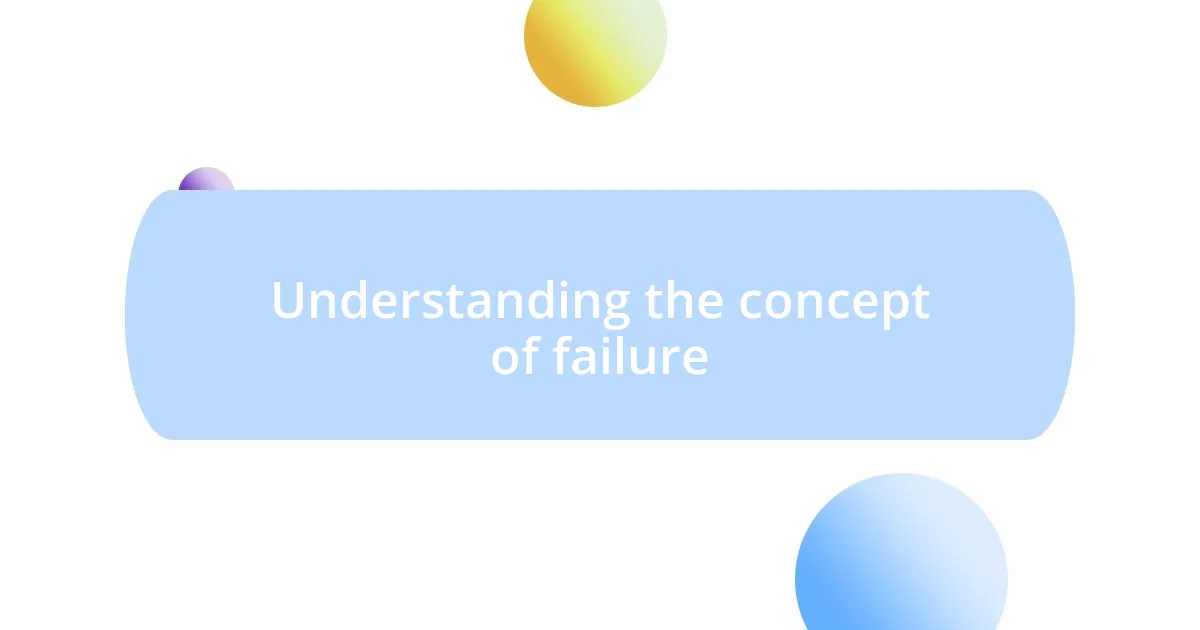
Understanding the concept of failure
Failure often feels like a heavy weight, doesn’t it? When I faced my first significant setback in my career, I remember the sinking feeling in my stomach and the self-doubt that crept in like an unwelcome guest. That moment made me question everything, but it also served as a powerful turning point—one that reshaped my understanding of what failure really means.
Once, I poured my heart into a project that, in my eyes, was destined for success. Yet, it fell flat, leaving me feeling frustrated and lost. I couldn’t help but ask myself, “Was all that effort for nothing?” But that so-called failure was a lesson wrapped in disappointment. I learned that failure isn’t the end; it’s simply a step on the pathway to growth, filled with insights that can propel us forward.
There were moments when I was tempted to hide my failures, thinking they defined me. However, gradually, I began to see them as valuable experiences instead. Each misstep became a teacher, showing me the strengths I didn’t know I had and the resilience that can blossom from vulnerability. Isn’t it remarkable how what once seemed like a setback can later turn into a springboard for success?
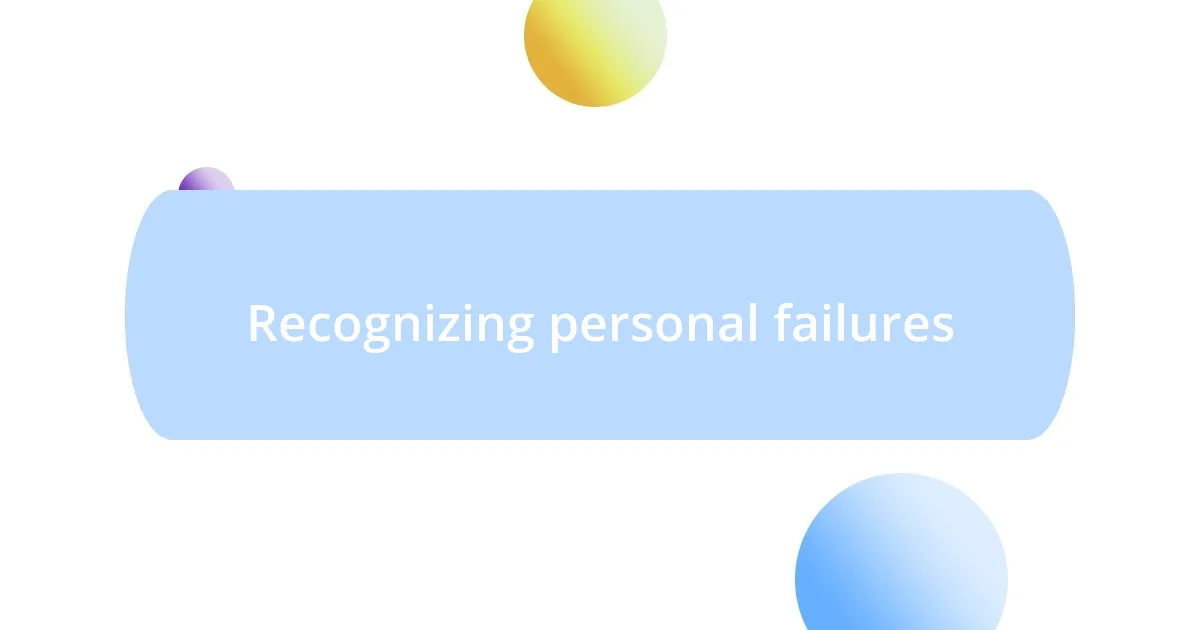
Recognizing personal failures
Recognizing personal failures is a crucial step in transforming them into stepping stones for success. I remember a time when I struggled with public speaking. One particularly disastrous presentation left me feeling exposed and embarrassed. Instead of wallowing in that humiliation, I made a pivotal choice: to confront it head-on. I realized that acknowledging this failure was the first step toward improvement.
It’s fascinating how hindsight can shed light on those painful experiences. On another occasion, I launched a business idea that I was passionate about, yet it completely missed the mark with my target audience. Initially, I felt defeated, but later, as I reflected on customer feedback, I recognized that this failure illuminated areas for future growth. It wasn’t just a failure; it was an invaluable lesson in understanding my audience better.
True growth begins when we can look our failures in the eye and accept them as part of our journey. I learned to write down my setbacks and analyze them. Doing so helped me identify patterns and fears that were holding me back. Each failure became a chapter in my story, rather than the whole narrative. By recognizing personal failures as opportunities for growth, I could turn my narrative around and move forward with renewed purpose.
| Personal Failure | Insights Gained |
|---|---|
| Public Speaking Disaster | Acknowledged fear led to practice and newfound confidence. |
| Failed Business Idea | Customer feedback revealed market needs and areas for growth. |
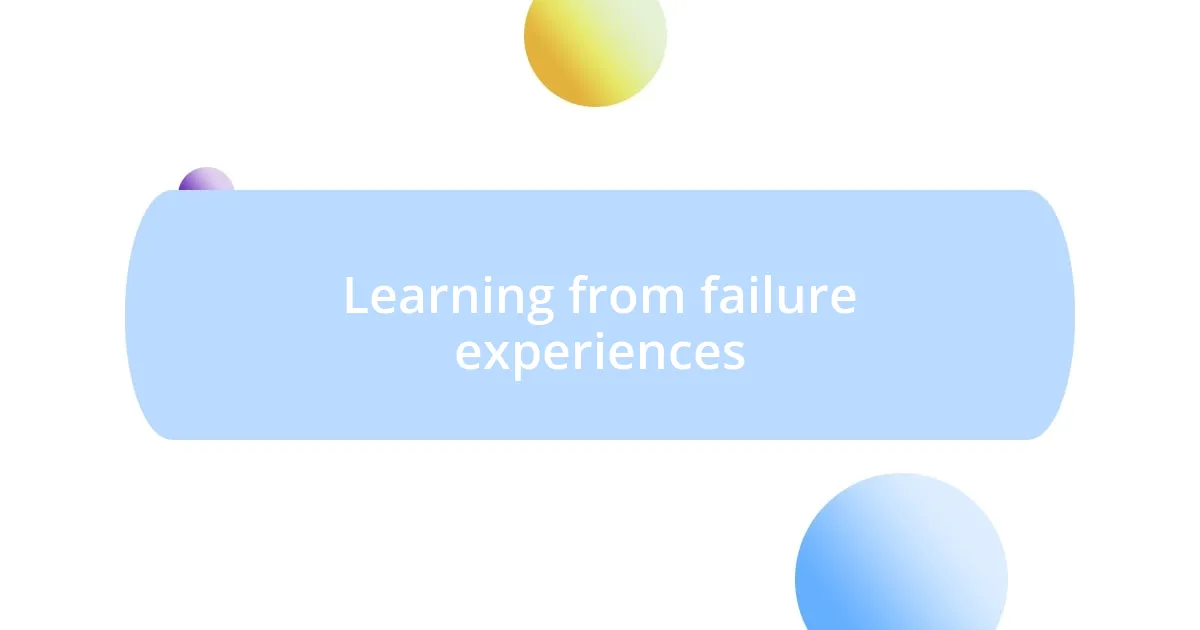
Learning from failure experiences
Learning from failure experiences is an eye-opening journey. I recall a time when I meticulously planned an event that turned out to be a catastrophe. The turnout was dismal, and I felt a wave of embarrassment wash over me. But as I analyzed what went wrong, I discovered hidden lessons about logistics and communication. This experience ignited a desire to improve, transforming my embarrassment into a drive for future success.
- Embracing Vulnerability: Admitting my shortfalls opened the door to personal growth.
- Gathering Feedback: I sought input from others to refine my approach, turning discomfort into constructive dialogue.
- Experimentation: Each failure became an opportunity to test new ideas without fear of the outcome.
It was like peeling back layers of an onion; each failure revealed something deeper about my capabilities. Once, I misjudged timelines for a project, and the resulting stress was overwhelming. I learned to prioritize better and recognize the value of patience. This shift in perspective reminded me that failures are not just setbacks but rich sources of insight that can lead to significant progress.
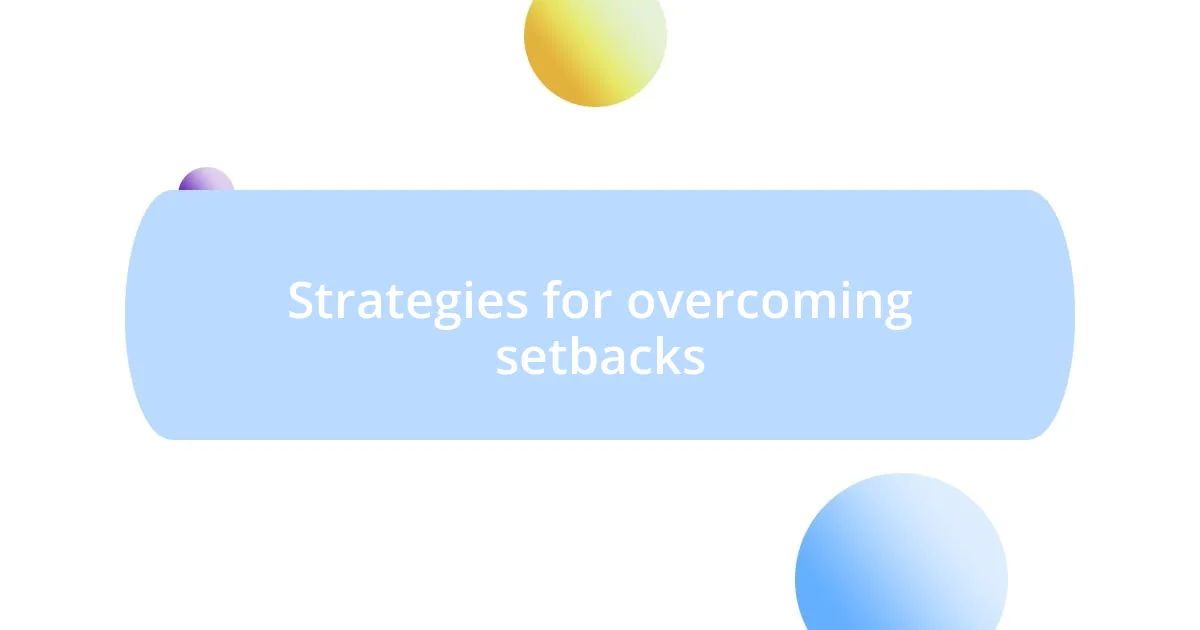
Strategies for overcoming setbacks
One effective strategy I’ve found for overcoming setbacks is to cultivate resilience through self-reflection. After facing a failed project, I took some time to journal about my feelings and thoughts. It was enlightening; writing allowed me to process my emotions and uncover underlying fears that I wasn’t even aware of. It’s amazing how understanding yourself better can pave the way for growth and renewed motivation. Have you ever taken a moment to pause and reflect? I truly believe that those quiet moments of introspection can lead to powerful revelations.
Another strategy that worked wonders for me involves setting actionable goals. I remember grappling with a major setback in my career where I felt completely lost. To regain my footing, I broke down my larger aspirations into smaller, manageable steps. Each small victory, whether it was completing a course or networking with professionals in my field, reignited my confidence. This approach transformed a daunting journey into a series of achievable tasks, reminding me that success is built upon incremental progress.
Additionally, embracing a support network has been invaluable in my journey. There was a time when I faced a considerable setback within my personal life, and reaching out to friends and colleagues made all the difference. They offered fresh perspectives and words of encouragement that lifted my spirits. Have you ever noticed how sharing challenges with others can lighten the load? It’s incredible how we can foster a sense of community and strength by simply being open about our struggles.
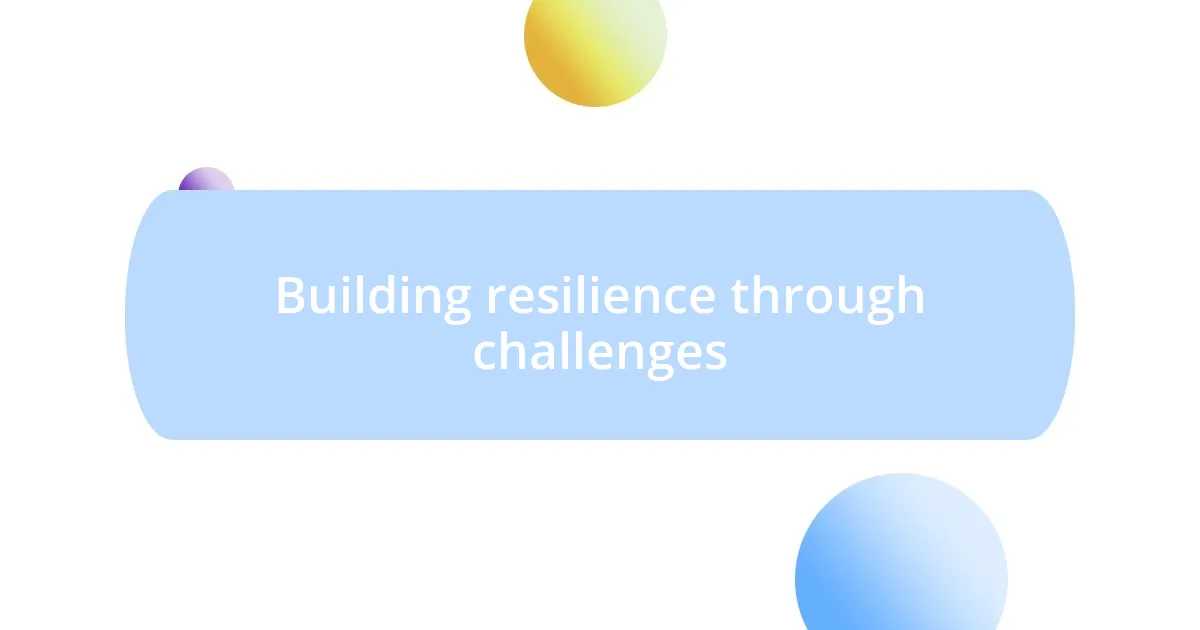
Building resilience through challenges
Building resilience through challenges has been a crucial part of my journey. I remember a time when I lost a crucial client due to a miscommunication on my part. At first, I was devastated and filled with self-doubt. But over time, reflecting on the incident made me realize the importance of clear communication and setting expectations. This moment, while painful, became a stepping stone that propelled me to strengthen not just my professional skills but also my self-assurance.
In facing challenges, I’ve found that embracing discomfort can be transformative. Once, during a particularly stressful project, I felt overwhelmed by the countless obstacles that popped up. Instead of retreating, I chose to lean into that discomfort. I took a day off to recharge and came back with a fresh mindset. This experience taught me that my capacity for resilience grows when I allow myself to feel and process tough emotions. Have you ever felt like stepping away from a stressful situation only to return with renewed clarity? I’ve realized that sometimes it’s essential to pause and breathe, rather than push through blindly.
The way I approach setbacks has evolved as well. I distinctly recall a moment when I burnt out after working on a project for months without breaks. Instead of seeing this as a failure, I recognized it as a signal to reassess my work-life balance. I started incorporating regular breaks and hobbies into my routine, which has been a game-changer. How often do we overlook our own well-being in pursuit of goals? I’ve learned that building resilience is not just about tackling challenges head-on but also about nurturing ourselves along the way.
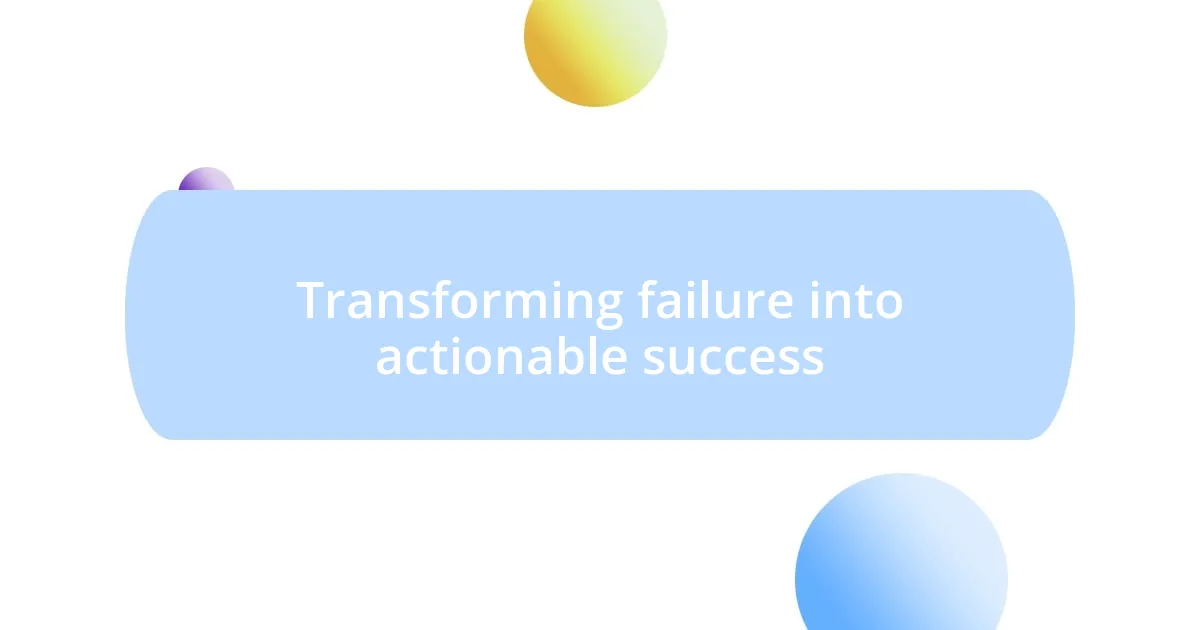
Transforming failure into actionable success
Transforming failure into actionable success is often about reframing our mindset. For instance, I remember a time when I applied for a job that I felt was perfect for me, only to be rejected. Initially, it stung—however, instead of wallowing in defeat, I reached out for feedback. The insights I received became the foundation for improving my interview skills and revamping my resume, ultimately leading to a role that was even better suited to my strengths. Have you ever turned a rejection into a stepping stone?
I also find that identifying the lessons hidden within failures is vital. When I launched a side project that flopped, it forced me to take a closer look at my planning stages. I realized that I hadn’t adequately researched my audience’s needs. By analyzing what went wrong, I created detailed customer profiles for my next venture. Hence, failure didn’t just teach me what to avoid but also how to better align my offerings with the desires of my target market. Isn’t it fascinating how every setback can carry the seeds of success if we’re willing to cultivate them?
Lastly, I’ve discovered that celebrating small wins can create momentum from failures. During a difficult stretch, I started documenting not just my setbacks, but also my progress, no matter how minor. I remember one week where I simply mastered a project management tool that had long intimidated me. That little victory boosted my morale and gave me the impetus to tackle bigger challenges. Have you acknowledged your small victories after a setback? These moments might seem trivial, but they form the building blocks of larger, more meaningful successes.
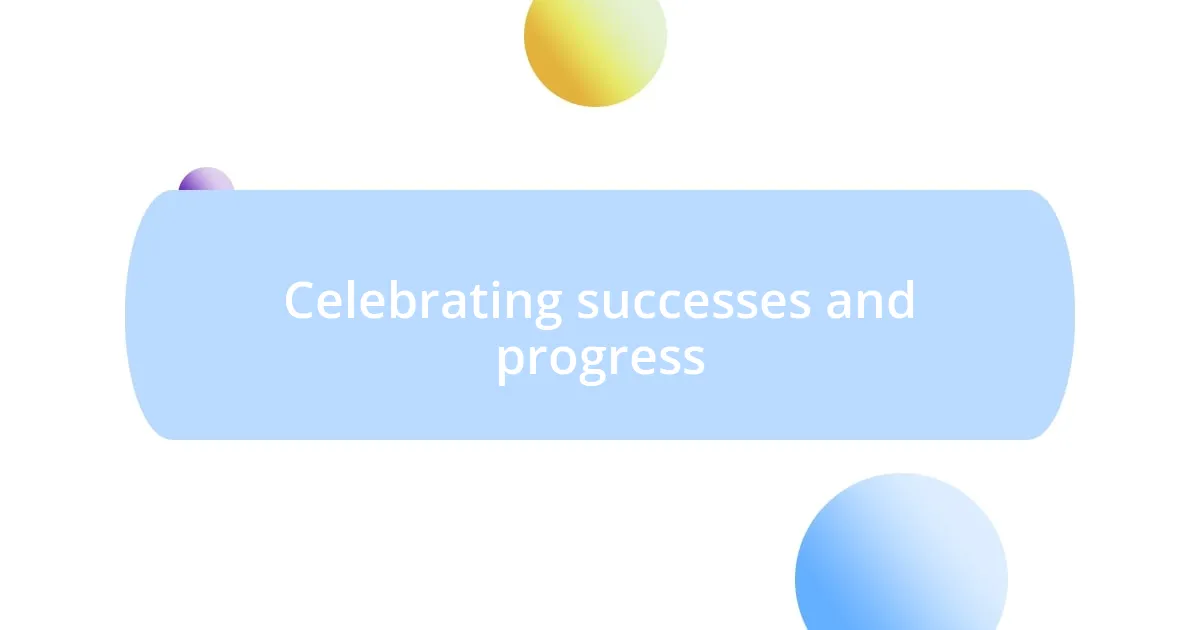
Celebrating successes and progress
Celebrating milestones, no matter how small, has become a vital practice for me. I remember when I completed a challenging online course that took weeks of late nights and hard work. The sense of accomplishment washed over me like a refreshing wave, pushing aside the fatigue. It was a reminder that even in the midst of busy days, progress is possible and worthy of celebration. Have you ever felt that joy after achieving something you worked hard for, even if it seemed small at the time?
Moreover, I’ve learned to commemorate progress through rituals. After finishing a project, I like treating myself to a nice dinner or a quiet evening with a book. This simple act of celebration reinforces the effort I put in and helps me appreciate the journey. It inspires me to keep reaching for the next goal. Do you have special ways to mark your achievements? These moments create a connection to my hard work and set the tone for what’s next.
Another aspect of celebrating successes is sharing them with others. I recall the time I shared a recent accomplishment with friends over coffee. Their genuine excitement not only made me feel supported but also reinforced my sense of belonging in my professional journey. Isn’t it amazing how sharing our victories can create a ripple effect of encouragement? I believe that every time we celebrate, we inspire those around us to recognize their own achievements, too.












